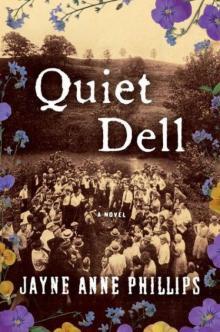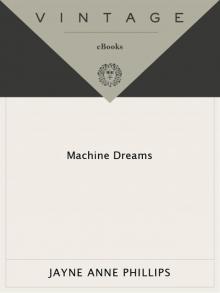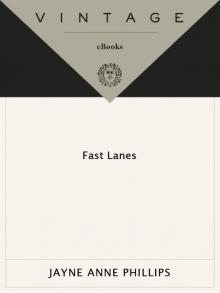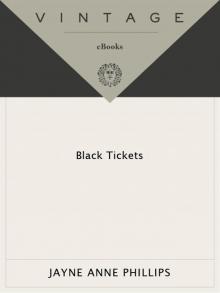- Home
- Jayne Anne Phillips
Lark and Termite Page 6
Lark and Termite Read online
Page 6
“Nick? I don’t know what I would have done all these years without Nick, you being as occupied as you are. He’s like my brother.”
“I didn’t say he takes an interest in you.”
“Oh. You think he takes an interest in Lark? Well, Nick’s not blind, but he’s not stupid either. That’s just you, Charlie, standing guard.” Then I ask Elise, “How can I help being fond of him?”
She shrugs, like it’s a real question.
Charlie keeps on. “I’ve said it before. They all take an interest in Lark. The Tucci boys, and Nick is one of them, have run through a portion of the available girls and women in Winfield.
Call it standing guard if you like. They’re family and not family, and they’re practically on top of you, all these years. That’s shaky territory, with those boys the ages they are.”
“It’s all shaky territory. Show me territory anywhere around here that’s not shaky.”
At the counter, Elise clears her throat and nods toward the plate-glass window. Sure enough, here comes Gladdy, in her summer hat. She has the look of a sparrow wearing a plate on its head, bobbing along in a quick step. “Here we are,” I tell Charlie. “I rest my case.”
The door opens and the ring of the bell puts me in mind of Termite. One more sound that can’t tell what it means.
“Afternoon, Gladdy,” Elise says. “Hot enough out there for you?”
She waits a moment, to get her breath. Once in a while I surprise myself and understand why Charlie puts up with her, why we all put up with one another. But Gladdy, as always, can be relied on to scuttle sentiment.
“It’s just fine,” she says. “I prefer the heat. Open windows and a cross draft are all anyone needs. Not that expensive air-conditioning that is so loud and gives a person bronchitis.”
Elise lights a cigarette. “You have bronchitis?”
Gladdy ignores her, but waves a hand in front of her face as though to shoo flies. She stands back and regards Charlie. “I noticed it again, Charlie. I can see the glass in that big plate window move when I walk past on the street. I keep telling you it needs tightening. One of these days it’s going to crack straight across.”
He smiles at her. “It’s not the glass, Mother. It’s you, moving the world.”
“Very funny. But we don’t have hundreds of dollars to replace that glass. Maybe a thousand dollars.”
“She’s right,” I tell Charlie, standing under the wheeze of the air conditioner. “We don’t have a thousand dollars.”
“And there are reasons why,” Gladdy shoots back.
Then I’m out the door and the heat is like a wave, even this late in the afternoon. I look back through the window and see Elise putting out her cigarette, getting up to follow me. Gladdy is trailing Charlie back into the kitchen, chirping away.
By the time I get to Elise’s blue Ford, she’s beside me, unlocking the passenger door, and we’re cranking down the windows, hauling both heavy doors open.
“Wait,” Elise says.
She’s of the opinion cars have to be aired out in the heat, that various chemicals in the upholstery and floor mats and cushioned ceiling can harm a person when the air in a car is closed and hot. We stand here, leaning on the doors. Maybe Elise is right. I can feel hot air boiling out of the car like invisible foam.
“Well,” I tell her, “at least we entertain you.”
“That you do.” She raises her penciled brows at me. “Gladdy was just saying how her leather watchband has been good enough for her all these years. Funny how there’s never a need to worry about being hard on Charlie. Gladdy will always do it for you.”
“True love,” I say, “you can’t beat it. You and I, now, we have to settle for life in general being hard on us.”
“We can’t complain,” Elise says, and smiles. “You got the time, Noreen?”
“I do and I don’t,” I tell her. She’s not really asking. It’s a phrase she repeats in front of Gladdy, to remind her of a sore point. My watch belonged to Charlie’s grandmother, his father’s mother. She gave Charlie the watch when he was twelve, before she died—she adored him and had the sense never to like Gladdy. Gladdy can’t abide the fact Charlie gave me a Fitzgibbon heirloom. He found a jeweler in Bellington to refurbish it with a flexible platinum band and says it was worth every penny. The emerald-cut diamonds beside the rectangular face are small but perfect. Guardians of our numbers, he calls them. I won’t marry him until Gladdy dies, and I won’t have him moving in with us either. Charlie says we’re on my time, I’m in charge. He loves the watch and he loves me wearing it. The mother-of-pearl face glows in the dark just slightly, and he checks it, evenings in my bed, the nights Lark is at Barker Secretarial. He comes over and bathes Termite, puts him to bed, turns on the radio. Charlie keeps it tuned to a classical station, so Termite isn’t agitated by words. Termite likes music without words, and he falls asleep surrounded. Then Charlie and I have time. The good hour, Charlie calls it. He closes his big hand around the watch and my wrist, firm and warm, like he’s saved this for me, and he has. All these years. I’m standing here with Elise, and something quickens, flickers, at the memory of his hand in me. I’ve been married. It wasn’t like this. We still want each other, we’re practiced, it all works. Then he’s up and gone before Lark gets home. We’re not hiding anything, but it’s our privacy, and it’s how I want it.
Elise cuts me a glance. “I do believe I’m driving you straight to my place for a cold beer, Noreen. You seem to need one, and you won’t get it at home. Seems to me you could relax your policy. How long is it now since you divorced the second husband, that high-flying alcoholic? Seventeen years?”
“Billy Onslow’s drinking was almost the least of it,” I tell her, “but I don’t fault him. We were married seven months, but he stood in for me for a lot of years, watching over Lola.” I rest the bag of food on the sidewalk. Elise will need to light herself another cigarette.
She chuckles and shakes her head. “Poor Lola, gone so long and still the elephant in the room. She got what she wanted, in a way. Well out of it and still pulling the strings.”
“There aren’t any strings,” I tell Elise. “There’s just what happened.”
“There’s Lark,” Elise says, “and there’s Termite.”
She offers me a cigarette and I take it. We stand here smoking, adjusting to the heat.
• • •
Charlie will say how strange it is I lit out of here so fast without him, only to move back years later, after all that happened, even closer to the tracks and the river and the skinny houses of Polish Town. Well, a house on a grass alley two streets from the rail yard was what I could afford, and lucky to have it. Gladdy thought it was where I belonged, of course. When I was nineteen and Charlie’s father died, she had a prime excuse for handing everything over to Charlie. The husband she’d driven to his grave was gone, and the son inherited all, including Gladdy. Your first responsibility is the business, she told him. Without your father, we could lose everything. You’ll regret knowing such a girl. Don’t make it a permanent mistake. Think of your religion, she kept saying. And you know, he did. He’s Catholic to his bones, while it’s all show with Gladdy. What if Noreen converted, he’d say, to watch his mother blanch. Charlie knew I wasn’t about to take up Catholicism, but he didn’t know I’d leave him.
I worked full-time at Murphy’s Five & Ten the two years after high school, promoted to floor supervisor, learning bookkeeping. I’d saved money and I was going to marry Charlie or else. We need to wait, he said. How long? I asked. Gladdy will live forever. He called me unfeeling—his father had dropped dead a month before—but I was hell-bent. It was Gladdy or me; he had to choose. She’s my mother, he kept saying, like that was sacred. Not to me. I’d pretty much raised myself and Lola. We’d done without mothering, and I thought it was time Charlie did. I knew a girl who had a cousin in Atlanta, so I packed two suitcases and rode out of town on the bus. Lola begged me not to go, and then she begged to come
with me. I grew up here, I told her, you’ll have to do the same. And don’t even think of coming to find me until you’ve graduated high school.
I walked out on all of them. I rode buses three days and nights, washing my face in filthy restrooms, stepping over families asleep in the depots. It was 1936, hard times, but I felt free, almost grateful to Charlie. The cousin rented me a room and I got a job as a window dresser at Lowman’s Department Store in Atlanta, then as a waitress in the store restaurant, a big place always busy with shoppers and businessmen. I got to know an insurance executive who took lunch and dinner at my station nearly every day. His wife had died the year before, and his two little boys a decade earlier, the same week, of diphtheria. It’s not too late, I thought, I’ll marry him and give him children. We’ll live in his brick house with the floating staircase and have babies. But I couldn’t. Doctors told me I never would. All Charlie’s careful timing and confession and prayers had been needless: I laughed till I cried, and they were the last tears I shed over it, then to now. Barren, they called it in those days. Maybe so, but barren ground is strong, clear ground.
I left the husband after four years. He’d met a nice woman his own age and I gave them my blessing. Bad things had happened to him, and I didn’t want to keep being one of them. He said I’d helped him through a difficult time and he paid a year’s rent on my new apartment. The Depression was over. I left with my clothes and got my old job back at the restaurant. A lot of places folded, but Lowman’s stayed open. War had started in Europe. The city seemed alive again, nervous and edgy; the restaurant was busy and hired more staff. Then Charlie showed up, with Lola outside in his car. She was out of control, he said. I was her sister. What were we going to do? He said it just like that—like we were family. And I knew we were.
Gladdy would have been happy if Charlie had married a nice Catholic girl and moved her in with them to do whatever Gladdy said. Just to spite her, or maybe to spite himself, Charlie didn’t. His heart murmur kept him out of the service, at home with Gladdy and the business. We weren’t in touch, but Lola wrote to me every month, and I answered. When our father died, I sent flowers. Our mother got sick. Lola, the two years after she graduated high school, took care of her alone. I sent money to support them, but I wasn’t going back, not even for the funeral. A few days after, the house burned. People said Lola had thrown a lit match onto the newspapers by the stove, that the house burned so hot she must have poured kerosene from one room to another. She turned up at Charlie’s lunch counter with her suitcase while the sirens were still blaring. Nonie’s left her husband, she told Charlie, and she could take him to me. He asked about the fire and she said it was the only way to burn up the smell of the sickbed, all the beds. Charlie knew he’d better get her out of town while everyone was occupied. Back then, Gladdy actually worked in the restaurant. For once, Charlie told her he had to go. He put Lola in the car and drove, pulling over to sleep when he had to. Lowman’s was a city block, an Atlanta landmark in those days, easy to find, and the restaurant was a third of the first floor. There Charlie was, sitting at a table by the window, where he could see his car and Lola in it.
I’d been a duty-bound insurance executive’s wife, answering expectations and reading Collier’s in bed afterward, but I was only twenty-four. Being in the same room as Charlie after so long was like opening a furnace door. I’ll never forget his face and his dark eyes as I walked over to him in my waitress uniform and red chiffon apron. We didn’t know it, but except for the apron and a few major interruptions, we were looking at the rest of our lives. He pulled me against him and held me and we looked into the street at Lola looking back at us, her face framed in the window of Charlie’s black car. She knew she’d accomplished something I never could: him standing there. You don’t need to worry, I told Charlie. She’s got what she wanted and she’s not going anywhere.
My shift ended an hour later and I took them to my apartment. Lola fell asleep on the sofa before I could even get a meal cooked. Charlie and I locked the bedroom against her, but we needn’t have bothered. She slept for three days. Charlie drove me to my Low-man’s shifts and looked for a job, but it was Lola who found him work, as a bouncer at Onslow’s, a club that took her on as a cigarette girl and backup singer. She had sheet music in her suitcase, and a beaded dress like the ones she’d seen in magazines. The Irish mob was big business, and so were the Italians and their gin joints. Billy Onslow was snug with both, and he owned establishments in Atlanta and Louisville. He was a big deal then, a bruiser musician in a sharkskin coat, pulling strings. I later found he dealt in interstate liquor transport and high-class call girls, but at the time I thought, fine, he can play piano for Lola. Soon enough his headliner was hospitalized after her hoodlum boyfriend broke her jaw, and Lola stepped in. She stopped singing backup and rehearsed afternoons like a regular career girl. She loved Atlanta, she bought clothes, she wanted Charlie and me to move to a bigger apartment with her, and I was thinking it over. I’d finish a dinner shift at Lowman’s and get to the club by ten, sitting there in a cream silk sheath dress and pearls while Charlie worked the door. Billy Onslow would come by and sit with me before Lola’s set, always very polite, courtly, like he was making sure the staff knew I was his guest and men knew not to approach me. He was almost thirty years older than Lola, but very different from my middle-aged ex-husband—Billy Onslow had certainly never sold insurance. I tried to give the impression I was watching over Lola. He’d listen, but one night he looked at me dead on. “I don’t usually meddle with the talent,” he told me, “but let’s not kid ourselves about your sister.”
Just then there was some commotion—you could say Onslow’s catered to a flamboyant clientele—and he got up and left. He could have meant any number of things, I told myself. That he was her lover, or had been. Or he was her lover and she had other lovers. Or worse, she was dabbling in entertainments the musicians enjoyed, coke or goofballs or junk. Onslow overlooked recreational use, Charlie had told me, he could hardly prevent it and was known to indulge himself, but he wouldn’t employ anyone who was strung out. Maybe he’d just meant no one could watch over Lola, that the whole idea was ridiculous, that I was ridiculous, a Lowman’s waitress in pearls. Yes, that was it. I was ridiculous.
It was 1941. We’d been living together six months, Lola in her makeshift room, Charlie and me in ours, coming and going together or separately, the little family Lola had finally made. We never referred to Winfield or Gladdy or the restaurant, we were together, and I suddenly wondered why Charlie had never mentioned getting married. Why I’d never mentioned it, why it had never even occurred to me. Why Lola slept so soundly on that couch behind the French screen she’d set up, the closet in the one bedroom overflowing with her dresses and lingerie. She’d bought me a big new bottle of my perfume with her first paycheck because she’d used so much of it. We sat at the same vanity at different times of day, combing our hair, putting on makeup, touching a crystal stopper from the same perfume bottle to our throats and ears and shoulders. Charlie smelled of both of us. So did the sheets of the bed. Here at the club there was a bed in Lola’s dressing room, and a chiffonier and a little sink. Charlie and she shared the same hours, like it was part of Charlie’s job, while at home she was just the little sister.
I sat at the bar, seeing Lola’s younger face in the dark bedroom of our house she’d burned down in Winfield, her eyes as close as the edge of the bed, Charlie actually inside me as we worked our way to the swooning novena we’d perfected. Good, I’d thought then, watch us, I won’t stop, I won’t let you take this from me. I’d closed my eyes against her then, just as I’d closed them now. It was midnight in Atlanta. Billy Onslow stood leaning against the wall on the opposite side of the big room, watching me. I knew he was in it with me, with us. He’d always deferred to me, shown me courtesies: he thought I was respectable and hardworking. He thought the same of himself, strange as that seems, despite his discreet alcoholism and other habits. He’d delivered his news on purp
ose, to pull me in with him and to change the lay of the cards. Billy was a master at reading everyone’s hand before they could. He knew exactly what I was realizing and how fast it would fall into place, and he waited for me to look at him. I did, and he moved toward me. His wet hazel eyes shone like glass. My dress felt hot against my thighs, and every pearl in the necklace I’d saved so long to buy burned on my neck like a match head. He could feel me in his hands already. He was the one man who ever turned full force from Lola to me, who rejected her when he could have had her. Later, even after I’d left him, he took care of Lola when I couldn’t.
That was a long time ago, when I wore that dress and those pearls.
Billy lived above the club. I went upstairs with him that night. I remember those hours, in rooms full of velvet furniture and racks of the showy costumes his dancers wore, file cabinets and piles of papers, and his bed that was big enough for four people. He was knowledgeable, Billy was, he could be gentle, and he used my feelings to surprise both of us. I didn’t sleep, and the next day, while Lola was at rehearsal, I went back to the apartment and told Charlie to get out. I can’t explain my state of mind. Charlie had been mine from the time I was a child myself. I thought he’d chosen me, was restored to me, but Lola had lit the fire that brought him, and she’d seduced or confused him into staying. He was devastated that I knew what he’d done and couldn’t stop doing, but it was only my knowing that allowed him to end it. I didn’t tell him to leave town. He exiled himself, drove back to Winfield and his whole favored-son routine without even saying good-bye to Lola.
When I take stock now, I think to myself, I have Charlie and Elise and Nick. I couldn’t have cared for these children without their help. It took time to come back to Charlie, but I love him still after thirty years, and I like having my own house, separate from his drama with Gladdy I really seldom think of Lola now. Except for the questions Lark used to ask and stopped asking, it’s over and done, it’s finished. Like Elise says, there’s Lark and there’s Termite. These children have got nothing to do with Lola, except they came through her to get to me. The one has stood on her own two feet since she was barely up to my elbow, and the other is happy with a piece of dry-cleaner bag a yard long and a few inches across.

 Quiet Dell: A Novel
Quiet Dell: A Novel Lark and Termite
Lark and Termite Machine Dreams
Machine Dreams Fast Lanes
Fast Lanes Black Tickets
Black Tickets